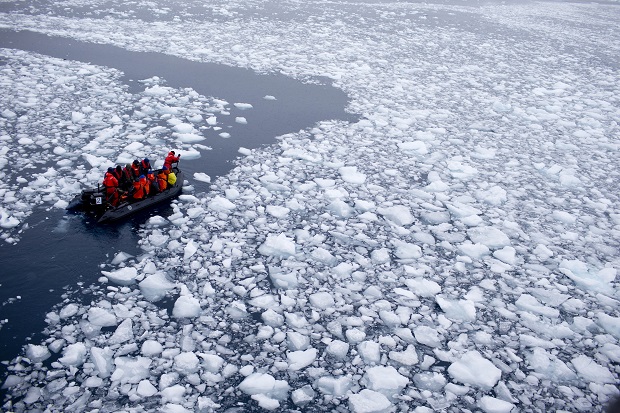The Antarctic Ocean has increased its absorption of CO2

In this Jan. 22, 2015 photo, a zodiac carrying a team of international scientists heads to Chile’s station Bernardo O’Higgins, Antarctica. Water is eating away at the Antarctic ice, melting it where it hits the oceans. As the ice sheets slowly thaw, water pours into the sea, 130 billion tons of ice (118 billion metric tons) per year for the past decade, according to NASA satellite calculations. AP Photo
WASHINGTON, United States—Defying earlier fears, the Antarctic Ocean has been absorbing increasing amounts of carbon dioxide over the past decade, researchers reported Thursday.
READ: Nations fail to agree on Antarctic marine reserve
The findings upend estimates, put forward a decade ago, that the seas surrounding the continent were approaching a saturation point and would not be able to continue to absorb increasing amounts carbon dioxide from the atmosphere.
Since that time, the amount of carbon dioxide and other greenhouse gases put into the atmosphere by human activity has only grown and, the new research shows, so has the amount of carbon dioxide absorbed by the Antarctic Ocean.
READ: Experts: Global warming means more Antarctic ice
This ocean, also known as the Southern Ocean, accounts for nearly half of the carbon dioxide absorbed by the world’s oceans, making it critical to mitigating the worst effects of climate change.
“The seas around Antarctica absorb significantly more CO2 than they release. And importantly, they remove a large part of the CO2 that is put into the atmosphere by human activities such as burning fossil fuels,” co-author Dorothee Bakker, of the University of East Anglia, said in a statement announcing the findings.
She noted that the previous suggestions of a saturation point had been surprising at the time and that these new findings show the Antarctic Ocean “has in fact regained its expected strength.”
The study, published in the journal Science, is based on surface water carbon dioxide measurements taken throughout the past decade.
The researchers, led by Nicolas Gruber of the university ETH Zurich, attributed this reinvigoration of carbon dioxide absorption to changes in prevailing weather patterns.
Another study published Thursday, in the journal Geophysical Research Letters, found a similar uptick in a specific region of the Antarctic seas, the Drake Passage that separates the ice-covered continent from South America.